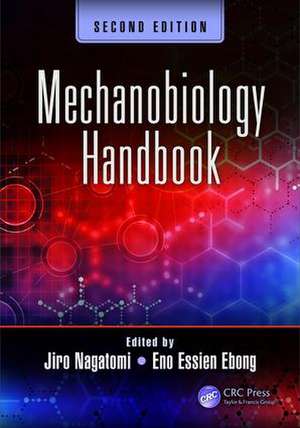Mechanobiology Handbook, Second Edition
Editat de Jiro Nagatomi, Eno Essien Ebongen Limba Engleză Hardback – 26 noi 2018
The editors of this book are researchers and educators in mechanobiology. They realized a need for a single volume to assist course instructors as a guide for didactic teaching of mechanobiology to a diverse student body. A mechanobiology course is frequently made up of both undergraduate and graduate students pursuing degrees in engineering, biology, or integrated engineering and biology. Their goal was to present both the elementary and cutting-edge aspects of mechanobiology in a manner that is accessible to students from many different academic levels and from various disciplinary backgrounds. Moreover, it is their hope that the readers of Mechanobiology Handbook 2nd Edition will find study questions at the end of each chapter useful for long-term learning and further discussion.
- Comprehensive collection of reviews of recent research
- Introductory materials in mechanics, biology, and statistics
- Discussion of pioneering and emerging mechanobiology concepts
- Presentation of cutting-edge mechanobiology research findings across various fields and organ systems
- End of chapter study questions, available online
Considering the complexity of the mechanics and the biology of the human body, most of the world of mechanobiology remains to be studied. Since the field is still developing, the Mechanobiology Handbook raises many different viewpoints and approaches with the intention of stimulating further research endeavours.
Preț: 896.77 lei
Preț vechi: 1190.56 lei
-25% Nou
Puncte Express: 1345
Preț estimativ în valută:
171.59€ • 179.64$ • 141.98£
171.59€ • 179.64$ • 141.98£
Carte tipărită la comandă
Livrare economică 07-21 aprilie
Preluare comenzi: 021 569.72.76
Specificații
ISBN-13: 9781498779463
ISBN-10: 1498779468
Pagini: 704
Ilustrații: 32 Illustrations, black and white
Dimensiuni: 178 x 254 x 42 mm
Greutate: 1.63 kg
Ediția:2 New edition
Editura: CRC Press
Colecția CRC Press
ISBN-10: 1498779468
Pagini: 704
Ilustrații: 32 Illustrations, black and white
Dimensiuni: 178 x 254 x 42 mm
Greutate: 1.63 kg
Ediția:2 New edition
Editura: CRC Press
Colecția CRC Press
Cuprins
Basic Science Tools for Mechanobiology Research. An Introductory Guide to Solid Mechanics. Fluid Mechanics. Molecular Analysis in Mechanobiology. Cadiovascular Systems. Effects of Endovascular Intervention on Vascular Smooth Muscle Cell Function. Effects of Pressure on Vascular Smooth Muscle Cells. Mechanobiology of Heart Valves. Mechanobiology of Cardiac Fibroblasts. Mechanobiological Evidence for the Control of Neutophil Activity. Stress.Skeletal Mechanobiology. Mechanical Control of Bone Remodeling. Cell Mechanobiology. Pulmonary Vascular Mechanobiology. Lung Echanobiology. Mechanical Signaling. Mechanobiology of Bladder Urothelial Cells. The Mechanobiology of Aqueous Humor Transport across Schlemm's Canal Endothelium. Mechanobiology in Health and Disease in the Central Nervous System. Mechanostimulation in Bone and Tendon Tissue Engineering. Mechanobiology in the Stem Cell Niche. Mesenchymal Stem Cell Mechanobiology. The Use of Microfluidic Technology in Mechanobiology Research. Design of Abdominal Wall Hernioplasty Meshes Guided by Mechanobiology and the Wound Healing Response.Statistical Analysis. Design of Experiments and Optical Techniques.
Descriere
This is a substantial revision of a former reference work, now developed as a primary text for emerging courses in mechanobiology/cell mechanics being offered in a growing number of biomedical engineering and chemical engineering departments worldwide. It will also serve as a professional reference book for engineers, scientists and clinicians.
